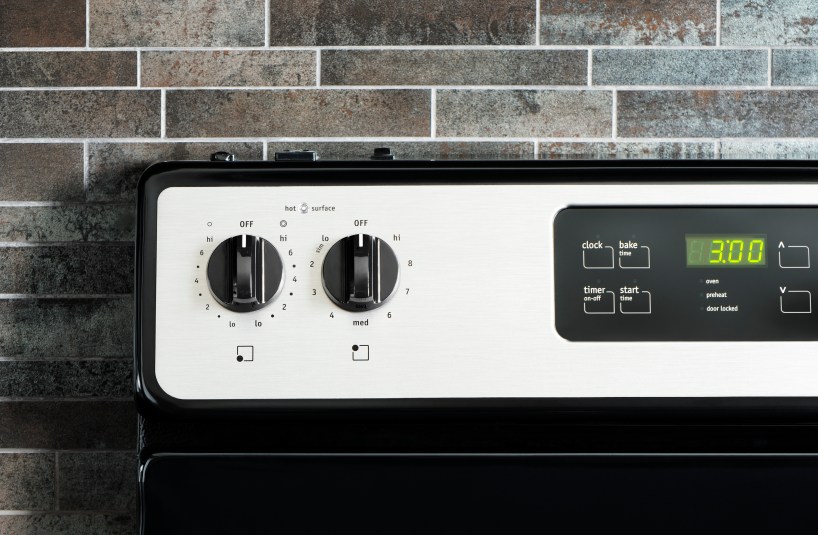The Simple Cooking Tweak That Will Help You Lose Weight Fast
Hint: It's as easy as adjusting your temperature.

NYU Medicine researchers have identified a side effect of stress that traps fat. The fix? Surprisingly easy cooking tweaks that can release stored fat — for good!
Several thousand years ago, when food was scarce and giant panthers might chase our ancestors on the way to the watering hole, people survived because their bodies adapted to hoarding calories as fat to burn for fuel later. The problem: What was an asset back then has become a curse in modern times. With all of the stressors flying at us day in, day out, our bodies still react by grabbing ahold of every calorie and locking it away in fat cells. And even when the stressors pass, many of us find it nearly impossible to drop those stubborn pounds — despite our best efforts. What gives?
The problem with heat-damaged proteins.
Recently, scientists from NYU School of Medicine discovered exactly what causes the body to hold on to those extra pounds — and with it, a way to release stored fat for good! The finding: Proteins found in common foods are damaged when cooked under high heat, and they wreak havoc throughout the body. David Turner, Ph.D., an associate professor at the Medical University of South Carolina, who has studied these proteins and their impact on the body, explains: “The problem is that heat-damaged proteins bind to a receptor that sits on top of fat cells, which stops the breakdown of stored fat.” This keeps fat stores locked in, so they can’t be burned for fuel even when the body isn’t under stress.
Complicating matters: Damaged proteins promote inflammation. While everyone is exposed to a certain amount of heat-damaged proteins, problems begin when these proteins accumulate, explains Jaime Uribarri, M.D., a physician and clinical investigator at the Icahn School of Medicine at Mount Sinai in New York City. “We know that when levels are high, they start to do bad things,” he says. The system-wide inflammation causes a range of health conditions — from weight gain and arthritis to diabetes and Alzheimer’s. Adds Dr. Uribarri, “That’s why it’s important to do what you can to lower your intake of heat-damaged proteins.”
The cooking hack to avoid heat-damaged proteins.
Luckily, it’s easier than you might think to slash your intake of these fat-packing compounds. Simply cooking meals at lower temperatures with a bit of liquid can cut the amount of heat-damaged proteins in the body by 81 percent, according to Mount Sinai School of Medicine researchers. That’s because methods like braising, stewing and slow-cooking raise the temperature enough to cook food but not to damage proteins, so the body is able to absorb the nutrients—and there are no damaged proteins to block fat burning. That can lead to effortless weight loss: Researchers at Denmark’s University of Copenhagen found that women who reduced their intake of heat-damaged proteins by changing their cooking methods for four weeks lost 57 percent more weight and 61 percent more belly fat than those who relied on grilling and frying. Plus, their levels of fat-packing insulin fell 202 percent.
Benefits you’ll notice — instantly!
“When you cut back on heat-damaged proteins, you can prevent and even treat everything from joint aches and pains to problems with sleep and skin health,” asserts weight-loss expert Ann Louise Gittleman, Ph.D. Indeed, women FIRST spoke to report renewed energy, improved mood, smoother skin and fewer wrinkles, as well as an end to heartburn and joint pain. Just ask 52-year-old Rhonda Roush, who lost 116 pounds by trading fried foods for slow-cooker soups: “I went from a couch potato to an active person,” she cheers. “I used to have trouble walking up the stairs in my split-level home, but now I’ve joined a boxing gym!” Ready to try it out for yourself? Read on!
Food swaps that make it easy:
While many diets require cutting out specific foods or even whole food groups, lowering your intake of heat-damaged proteins is as easy as changing the way you cook your favorite foods. Try these simple swaps to get started:
- Scrambled eggs contain 94 percent fewer heat-damaged proteins than fried eggs.
- A baked potato contains 90 percent fewer heat-damaged proteins than french fries.
- Beef cooked in a stew contains 78 percent fewer heat-damaged proteins than a pan-fried steak.
- Red wine has 66 percent fewer heat-damaged proteins than white wine.
- Al dente pasta has 54 percent fewer heat-damaged proteins than pasta cooked until soft.
This story originally appeared in our print magazine.













